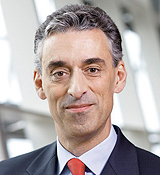DHL expects to add to its recent express market-share gains in Europe thanks to anticipated fall-out from the proposed acquisition of TNT by FedEx.
Deutsche Post DHL CEO Frank Appel said the timing of the announcement in April meant that customer uncertainty had not contributed to DHL Express’ strong time-definite international (TDI) growth in the first quarter. But he expected that the takeover would benefit his business in the short term by providing opportunities to win customers.
Nevertheless, he also called for regulators to look closely at the deal. Following the announcement yesterday of the company’s first-quarter results, Appel told analysts that his attitude to the proposed FedEx-TNT takeover was the same as it had been to the planned acquisition of TNT by UPS, which was abandoned two years ago due to regulatory concerns.
“The authorities have to assess these things very carefully,” said Appel. “TNT is a European company with a European airline, which is not easy to operate as a US company.
“There might be some markets impacted. It will change the competitive landscape as well in Europe, and we believe that the anti-trust authorities of the Commission should look into this carefully, and other authorities as well in other parts of the world – as they have done last time – and we will see what the outcome will be.
“But it is a good situation for us at the moment, because it creates uncertainty for both. We saw that TNT had a not particularly thrilling first quarter,” he commented. “Customers, if they look for a safe harbour, they are very welcome in our camp. So for us, it is the same opportunity as we had a couple of years ago when UPS tried to acquire TNT.”
Analysts observed that DHL’s European TDI volumes seemed particularly strong in the first quarter, particularly given the underlying weaknesses of some parts of the European economy. Asked what was going on there, Appel responded: “On the TDI, I believe that is the result of the outstanding service quality that we are gaining market share in Europe.
“The second thing is that e-commerce plays a part role here as well. There is a significant amount as well; people are willing to pay for next-day delivery cross-border, and we see benefits from that as well. We are the definitely the strongest player in Europe, gaining significantly market share in that field.”
“So I think it is the underlying service quality. But we are confident that this can continue, because we are heavily investing in Europe as well, in our expansion of capacity, and that should help us to be the leading supplier – not only in Europe, but in the international express business overall.”
DHL Express reported 7.1% growth in TDI volumes globally in the first quarter, and in Europe, per-day TDI shipment volumes were up 10.2%, year on year. Although yields were down several percentage points, Appel said this was due to lower fuel surcharges, and that underlying yields were “stable”. Similarly, in the Time Definite Domestic (TDD) product line, daily volumes were up 5.3%, while daily revenues remained at the prior-year level.
But analysts noted that the company’s TDI growth in the Americas had lagged the other regions, with just 0.6% more shipments sent each day in the TDI product line – although daily international shipment revenues increased by 6.3%, thanks to positive currency factors.
CFO Larry Rosen responded: “In the Americas, there are probably two factors for the lower TDI growth. One is the low activity with the Department of Defense, as the US draws down its activities in the Middle East. That was an important business for us, and so that is reflected in the year-over-year growth.
“The other factor is the weakness in some Latin American economies, where we have seen little or even negative growth in some of the countries. That has had an impact overall in the growth of the Americas region for express.”
Asked about the development of the group’s e-commerce parcel business outside of Germany, Appel said this had been especially impacted by positive currency factors. “The underlying growth for those two businesses – Europe and also e-commerce outside of Europe – was about 4%; so we are pleased with that.”
He said the biggest part of this was the businesses that the group had transferred over from Express in May last year to the new PeP division. This included the Blue Dart business in India as well as several countries in Europe, including Poland, Czech Republic, and Benelux.
“We are doing well in all of those business; the transition has gone really smoothly,” Appel said. “I would say that the orientation of the business from a B2B business, in particular the European businesses, to a B2C business – and one that capitalises very much on e-commerce – is going extremely well, and is pretty much completed.” He said more news could be expected in the near future about activities in additional countries.
Appel also gave further details about the problems currently affecting the group’s Global Forwarding, Freight business unit, where profits fell by almost two thirds in the first quarter and volume growth lagged market expansion in both air and ocean. He said the company had suspended the rollout of the division’s New Forwarding Environment IT transformation programme while he and interim divisional CEO Renato Chiavi analysed the initial effects of the rollout and worked on ways to improve the business. This assessment was expected to take several weeks, Appel said.
But he insisted that the problems affecting the forwarding business would not impact on any joint bidding activity with the group’s Supply Chain business. “The underlying business is still healthy, and so we can also still work with our Supply Chain colleagues constructively together,” Appel said. “The overlap is relatively small anyway; there is not a significant overlap of the two divisions.”












